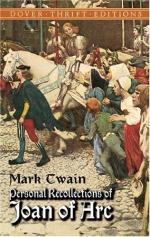“Let us put sentiment and patriotic illusions aside, and look at the facts in the face. What do they say? They speak as plainly as the figures in a merchant’s account-book. One has only to add the two columns up to see that the French house is bankrupt, that one-half of its property is already in the English sheriff’s hands and the other half in nobody’s—except those of irresponsible raiders and robbers confessing allegiance to nobody. Our King is shut up with his favorites and fools in inglorious idleness and poverty in a narrow little patch of the kingdom—a sort of back lot, as one may say—and has no authority there or anywhere else, hasn’t a farthing to his name, nor a regiment of soldiers; he is not fighting, he is not intending to fight, he means to make no further resistance; in truth, there is but one thing that he is intending to do—give the whole thing up, pitch his crown into the sewer, and run away to Scotland. There are the facts. Are they correct?”
“Yes, they are correct.”
“Then it is as I have said: one needs but to add them together in order to realize what they mean.”
She asked, in an ordinary, level tone:
“What—that the case of France is hopeless?”
“Necessarily. In face of these facts, doubt of it is impossible.”
“How can you say that? How can you feel like that?”
“How can I? How could I think or feel in any other way, in the circumstances? Joan, with these fatal figures before, you, have you really any hope for France—really and actually?”
“Hope—oh, more than that! France will win her freedom and keep it. Do not doubt it.”
It seemed to me that her clear intellect must surely be clouded to-day. It must be so, or she would see that those figures could mean only one thing. Perhaps if I marshaled them again she would see. So I said:
“Joan, your heart, which worships France, is beguiling your head. You are not perceiving the importance of these figures. Here—I want to make a picture of them, her eon the ground with a stick. Now, this rough outline is France. Through its middle, east and west, I draw a river.”
“Yes, the Loire.”
“Now, then, this whole northern half of the country is in the tight grip of the English.”
“Yes.”
“And this whole southern half is really in nobody’s hands at all—as our King confesses by meditating desertion and flight to a foreign land. England has armies here; opposition is dead; she can assume full possession whenever she may choose. In very truth, all France is gone, France is already lost, France has ceased to exist. What was France is now but a British province. Is this true?”
Her voice was low, and just touched with emotion, but distinct:
“Yes, it is true.”
“Very well. Now add this clinching fact, and surely the sum is complete: When have French soldiers won a victory? Scotch soldiers, under the French flag, have won a barren fight or two a few years back, but I am speaking of French ones. Since eight thousand Englishmen nearly annihilated sixty thousand Frenchmen a dozen years ago at Agincourt, French courage has been paralyzed. And so it is a common saying to-day that if you confront fifty French soldiers with five English ones, the French will run.”




